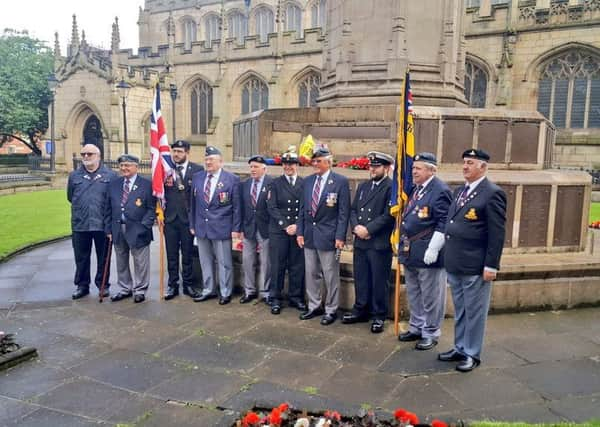Commemorations 100 years after Battle of the Somme


Ceremonies across the United Kingdom honoured the hundreds of thousands of victims of the brutal offensive which started in northern France on July 1 1916.
The two-minute silence ended at 7.30am, the time when the British, Commonwealth and French forces went “over the top” a century ago.
Advertisement
Hide AdAdvertisement
Hide AdThe British Army suffered almost 60,00 casualties on the first day alone and more than a million men would be killed or wounded on both sides over the course of the 141-day offensive.
The silence came after a night-long vigil led in Britain by the Queen and at the Thiepval Memorial to the Missing of the Somme, which towers over the rolling Picardy fields where so many fell.
Senior royals including the Duke and Duchess of Cornwall, the Duke and Duchess of Cambridge and Prince Harry, will join Prime Minister David Cameron and French President Francois Hollande and other leaders at the memorial later for a service of remembrance in front of an audience of 10,000.
Whistles were blown and Big Ben chimed when the two minutes were over, though many still continued to pause in reflection.
Advertisement
Hide AdAdvertisement
Hide AdThroughout today Manchester will come to a standstill today to mark a century since the start of the Battle of the Somme.
The city is hosting a series of events on behalf of the nation to commemorate the First World War battle, with tens of thousands expected to pay their respects at a military parade, cathedral service and evening concert.
Many of the dead were from the patriotic Pals battalions formed in Lancashire and across the North and for more than 60 per cent of the Army, this was their first experience of war.
By the end of battle, lasting 141 days, more than a million soldiers had been killed and wounded on both sides of the fighting in northern France.
Advertisement
Hide AdAdvertisement
Hide AdOvernight the Imperial War Museum North in Manchester was lit with huge light projections of images in memory of the soldiers who would have been preparing to go into battle one hundred years ago.
Events in Manchester begin with a wreath laying ceremony at 1.45pm at the war memorial in St Peter’s Square, followed by a parade featuring military personnel and descendants of those who fought at the Somme, marching past Manchester Town Hall at 2pm, continuing along John Dalton Street and Deansgate to finish at Manchester Cathedral, where a service of commemoration will be held for 1,000 guests at 3pm.
Tonight at 7.30pm, an evening of remembrance will begin for 20,000 guests at Heaton Park, on the outskirts of the city, which was used as a training camp for soldiers before they were sent to the trenches.
The park will ring out again to songs popular with soldiers at the time, including It’s A Long Way To Tipperary, Pack Up Your Troubles and Keep The Home Fires Burning, sung by a children’s choir and accompanied by the Halle Orchestra.
Advertisement
Hide AdAdvertisement
Hide AdThe concert will close at sunset with poet Lemn Sissay reading a commissioned piece dedicated to the memories of the lives lost and changed forever during the trench warfare, before Colour Sergeant Jonathon Hammond plays the Last Post to round off the day-long commemorations.